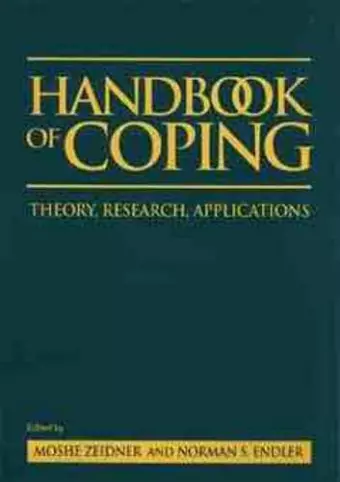Handbook of Coping
Theory, Research, Applications
Moshe Zeidner editor Norman S Endler editor
Format:Hardback
Publisher:John Wiley & Sons Inc
Published:9th Jan '96
Currently unavailable, and unfortunately no date known when it will be back

"...how a man rallies to life's challenges and weathers its storms tells everything of who he is and all that he is likely to become." —St. Augustine
It has long been understood that how a person adjusts to life stresses is a major component of his or her ability to lead a fulfilling life. Yet it wasn't until the 1960s that coping became a discrete topic of psychological inquiry. Since then, coping has risen to a position of prominence in the modern psychological discourse—especially within the personality, cognitive, and behavioral spheres—and, within the past decade alone, many important discoveries have been made about its mechanisms and functioning, and its role in ongoing psychological and physical health and well-being.
A book whose time has come at last, the Handbook of Coping is the first professional reference devoted exclusively to the psychology of coping. Reporting the observations and insights of nearly sixty leading authorities in stress and coping from a wide range of affiliations and schools of thought, it brings readers the state of the art in coping theory, research, assessment, and applications. In orchestrating the book, the editors have scrupulously avoided imposing any particular slant or point of view, other than the need to foster greater eclecticism and cooperation between researchers and clinicians concerned with the phenomenon of coping.
The Handbook of Coping is divided into five overlapping parts, the first of which serves to lay the conceptual foundations of all that follows. It traces the history of coping from its origins in psychoanalytic theories of unconscious defense mechanisms, and provides an exhaustive review of the latest conceptualizations, models, and constructs. The following section provides an in-depth exploration of current research methodology, measurement, and assessment tools. Part Three explores key facets of coping in a broad range of specific domains, including everyday hassles, chronic disease, cataclysmic events, and many others. The penultimate section focuses on individual differences. Among important topics covered here are coping styles and dispositions; the role of family, social support, and education; and coping behaviors across the life span. The final section, Part Five, is devoted to current applications. Clinical parameters are defined and a number of specific interventions are described, as are proven techniques for helping clients to improve their coping skills.
...ISBN: 9780471599463
Dimensions: 244mm x 162mm x 47mm
Weight: 1177g
752 pages